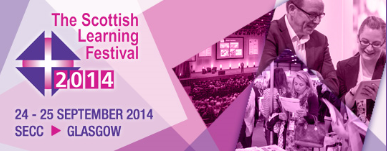August 11, 2014
by User deactivated
0 comments
 THE SCOTTISH LEARNING FESTIVAL 2014: RAISING ACHIEVEMENT AND ATTAINMENT FOR ALL
THE SCOTTISH LEARNING FESTIVAL 2014: RAISING ACHIEVEMENT AND ATTAINMENT FOR ALL
SLF 2014 is completely FREE for everyone to attend and will support practitioners as they explore a wide range of practical approaches, resources and research aimed at improving achievement and attainment for all learners in Scotland.
There will be inspirational keynotes speeches, conversation and debate in the professional discussion sessions and professional learning seminars where you can engage in activities and learn from practitioners and young people;
This includes a number of seminars specifically aimed at addressing the sciences curriculum.
Wednesday 24th
Learning for sustainability – a strategic agenda for change – SLF Guide Page 7
In February 2014, the National Implementation Group for Learning for Sustainability was established to ensure all learners in schools experience global citizenship, outdoor learning, sustainability, children’s rights and play in a transformative way. This seminar will outline the ambitions of the group and this exciting agenda for change which will impact on all schools and support the introduction of the new GTCS Professional Standards.
Thursday 25th
Supporting primary science to inspire STEM careers – SLF Guide Page 21
STEM subjects are central to Scotland’s economic future and our health and wellbeing. They also offer a range of excellent career opportunities for young people. This seminar will demonstrate how SSERC and Education Scotland provide valuable support for primary practitioners to enthuse and inspire learners about science and STEM careers.
Thursday 25th
Engaging pupils with science – SLF Guide Page 23
Outlining the various projects Aberdeen City have developed, which have increased pupils’ engagement and enthusiasm in science. This includes the S6 Science Ambassador Award; Science Buddy Award; P6/7 Science Champions; Intertek Science Fair; Science for PSAs & Playground Science.
To book your place browse the conference programme, note the seminars you want to
attend and visit the SLF website – www.scottishlearningfestival.org.uk.
Register on line today.
 The new Primary Science Glow 365 site is currently under development but at the moment we have a Primary /Early Years blog page which is easily accessible and provides up to date relevant information for practitioners in each sector.
The new Primary Science Glow 365 site is currently under development but at the moment we have a Primary /Early Years blog page which is easily accessible and provides up to date relevant information for practitioners in each sector.





